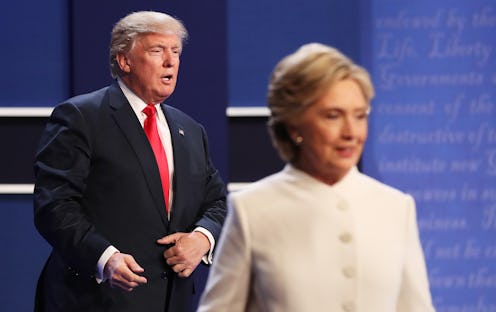News
Obama Apparently Had A Plan In Case Trump Lost The 2016 Election & Rejected The Results

Two of President Barack Obama's former employees divulged some interesting information about the lead-up to the 2016 election this week. Speaking with New York magazine, they said that if Hillary Clinton won in 2016 and Trump rejected the results, there was a plan in place to help ease any controversy that may have ensued.
“There was recognition that we had a Democratic president who was quite popular but also divisive for a portion of the population,” Jen Psaki, Obama’s communications director, told the magazine. “For them, just having him say the election was legitimate was not going to be enough."
So, according to the report, Obama planned to enlist a number of officials from across the political spectrum. These reportedly included Colin Powell, Condoleezza Rice, congressional Republicans, and even former presidents. If Clinton had won the election and Trump proceeded to dispute the result, all of these people would come out to publicly affirm that the election was legitimate and that the vote was accurate.
Indeed, as the election drew closer and closer, candidate Trump often lamented that the entire process was "rigged," suggesting that Clinton was going to win because the electoral system was working against him. "First of all, it was rigged," he said at an Ohio rally during his first campaign, according to multiple reports from the time. "And I'm afraid the election is gonna be rigged. I have to be honest."
He also shared this opinion on Twitter. On Oct. 16, 2016, he tweeted, "The election is absolutely being rigged by the dishonest and distorted media pushing Crooked Hillary - but also at many polling places - SAD."
On the same day, he also tweeted, "Polls close, but can you believe I lost large numbers of women voters based on made up events THAT NEVER HAPPENED. Media rigging election!" In a separate tweet, he elaborated that the "election is being rigged by the media, in a coordinated effort with the Clinton campaign, by putting stories that never happened into news!"
In August of that same year, President Obama described Trump's assertion of rigging as "ridiculous," according to the AP. "It wasn’t a hypothetical,” Obama's senior aide and speech writer Ben Rhodes told New York. "Trump was already saying it on the campaign trail.”
The advisers explained to the magazine that the focus was on how to respond to an increasingly polarized electorate. "We didn’t spend a lot of time theorizing about the worst thing that could happen — this isn’t a science-fiction movie. It was more about the country being incredibly divided and Trump’s supporters being angry," Psaki told the magazine. "Would there be protesting? I don’t want to say violence, because we didn’t talk about that as I recall.”
Ultimately, of course, Trump did win the election, even though a multitude of polls at the time suggested that Clinton was the all-but-guaranteed victor. But as was the case in 2016, President Trump remains incredibly influential among his base, meaning that his claims of rigging — which have thus far proven unfounded — stand to impact how people interpret U.S. politics. And that means that what he says, true or not, matters.